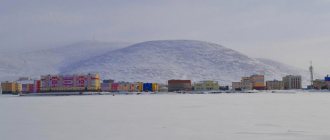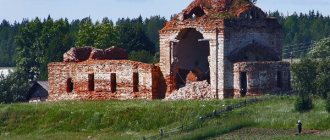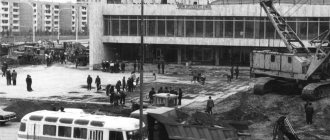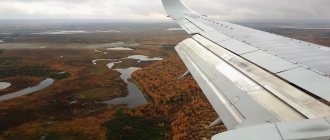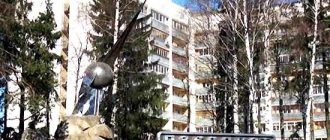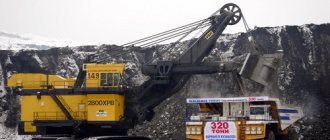Author: Varvara Lyutova
21 May 2022 18:58
Community: Travel
Tags: closed city unusual Ozersk dangerous places travel radioactivity secret place nuclear production
20011
7
In 2001, there were 42 closed cities in Russia. As a rule, these were cities associated with the production of weapons or military equipment. To get to such a place, you needed special documents and a good reason - for example, the presence of relatives living there. Today there are 15 closed cities in Russia. One of them is Ozersk in the Chelyabinsk region, which, according to journalists, is the place with the highest level of radioactive contamination in the country.
0
See all photos in the gallery
Meanwhile, radiation contamination was gradually becoming a significant problem for Ozersk
0
Source:
Over the course of several decades of Mayak PA history, several accidents occurred here, accompanied by the release of radioactive waste. The first major accident occurred in 1957, just 10 years after the opening of production. On September 29, one of the containers in which highly radioactive waste was stored exploded at the Mayak Production Association. As a result of the explosion, almost the entire city was exposed to radioactive contamination. And not only the city: after the explosion in Ozersk, the so-called East Ural radioactive trace was formed, about 300 kilometers long and 5-10 kilometers wide. According to experts, the contamination was 2-3 times higher than three decades later in Chernobyl. Of the villages in this territory with an area of about 20 thousand sq. km. Residents were evicted, but Ozersk itself continued to function as if nothing had happened.
Ozyorsk city
The city of Ozyorsk is located in the north of the Chelyabinsk region. Quite a young technopolis. It owes its birth to a chemical plant, which it was decided to build for the needs of the country’s defense in 1945.
Coordinates for GPS navigator
55.75938138263884, 60.70822091015615
Ozyorsk on the map
The first builders arrived near Kyshtym in the spring of 1945 and literally within a year they built the first workshops of the plant, dugouts for workers, and then the city infrastructure on of Lake Irtyash The city began with a detachment of special settlers, a battalion of soldiers, five tractors and two cars and horses with carts.
The construction of the plant for the needs of the defense nuclear industry of the USSR was initiated by physicist Igor Kurchatov on the instructions of Joseph Stalin and under the personal patronage of Lavrentiy Beria.
At different times Ozersk bore different names. This is Base-10, and the village of the state chemical plant named after. Mendeleev, and Chelyabinsk-40 and Chelyabinsk-65. Since 1994, the official name of one of the most beautiful cities in the Chelyabinsk region is Ozersk. It is Ozyorsk, and not Ozersk, as can sometimes be heard in the media, whose reports are dedicated to this closed city.
Only since 1995 the city of Ozyorsk began to appear on official maps of Russia. The nuclear town of Ozyorsk and its chemical plant “Mayak” are located on the eastern shore of Lake Irtyash. Geographically between the cities of Kyshtym and Kasli, if the path is laid along the southeastern bank of the Irtyash.
Irtyash is the main city reservoir along which the water border of the city passes. The lake is of volcanic origin. Mirror area 32 sq. km. The average depth is 8.7 meters, the maximum depth reaches 19 meters. On the opposite bank of the Irtyash, on the other side of the city, there are city and industrial recreation centers. The Kyshtym-Kasli highway runs there. This bank of the Irtyash is “populated” en masse by Sverdlovsk residents on summer weekends.
In addition to Irtyash, the city is surrounded by Lake Bolshaya Nanoga and Lake Malaya Nanoga. These three lakes are quite suitable for fishing and swimming. There is also an industrial lake Kyzyltash (Kyzyl-Tash) within the urban area. The river flows near the northeastern outskirts of the city. Techa.
The city's landscape is a subzone of pine-deciduous forests. The climate is sharply continental. The absolute maximum temperature is +37 °C (August); absolute minimum –47 °C (January). Average precipitation is 393 mm (most of it falls during the warm period). Snow cover begins in October and disappears in April; lasts an average of 184 days. The maximum height of snow cover is 27 cm (in February). Freeze-up is observed in the 1st half of November, ice drift - in the 2nd half of March - 1st half of April. The predominant wind directions are western and southwestern.
In 2004, the closed city of Ozyorsk was officially expanded into open areas that became part of the Ozyorsk urban district. This is the village of Metlino, where the experimental station is located. The village of Novogorny, where the Argayash thermal power plant is located. The village of Bizhelyak, the village of Novaya Techa, the village of Selezni. The village of Bizhelyak, the village of Metlino, the village of Novaya Techa, the village of Selezni are rural settlements. These points are visited quite freely, entry into them is not limited in any way, but residents have the status of residents of a closed administrative town. The village of Metlino is located on the shores of the picturesque Lake Kazhakul, and the village of Novogorny has access to Lake Ulagach. The name of the city is very accurate - Ozersk.
According to various estimates, there are from 50 to 85 industrial enterprises operating in the city, of which several are large and medium-sized. Until recently, in addition to Mayak, a large well-known trust throughout the region was the construction organization YuUS - South Ural Construction, but reforms and the crisis did not bypass the closed territory.
Communication between Ozyorsk and other cities is by road. However, recently it has become possible to get out of the city along the water surface of Lake Irtyash, for which special permits must be issued. This has become convenient for Ozersk owners of small vessels - yachts and boats. There is also a railway connection with the nearest regional center - the city of Kyshtym, but this line is departmental, belongs to the plant and is used for transporting goods.
Ozersk has its own historical and cultural monuments. In the closed part of the district there is a station square named after. Lenin with a 5-meter-high monument to the leader of the proletariat, erected in 1960. There is a square named after. Kurchatov, with a sculpture of I. Kurchatov 4.5 meters high, installed in 1978.
There is Komsomolskaya Square, now Brokhovich Square, with a monument to the founders of the city “Prometheus”. The magnificent colorful Palace of Culture “Mayak” is conveniently located on this square.
There is the “Eternal Flame” complex in memory of the fighters for Soviet power in the Southern Urals, which now houses a modern memorial to soldiers who died in local conflicts.
There is a Victory Square, built on the high shore of Lake Irtyash in honor of the 40th anniversary of the Great Victory. In honor of the 50th anniversary of the Victory, a Victory Monument was erected in the park.
The city has its own local history museum. It contains exhibitions telling about finds from early Iron Age settlements, of which more than ten have been discovered on the territory of Ozyorsk.
Currently, in the city of Ozyorsk, the construction of the Christian Church of the Intercession of the Blessed Virgin Mary, the renovation of one of the Irtyash embankments and the arrangement of four municipal city beaches are being completed.
A favorite promenade spot for Ozersk residents is part of Karl Marx Avenue, popularly called “Broadway,” which houses a number of city shops built during the last five-year period of Soviet power. The main city celebrations take place here. City Day and Plant Day. Street celebrations and informal youth gatherings, often at night.
Weekend travel routes for Ozersk residents often run towards the Ural Mountains to Mount Egoza and Mount and Lake Sugomak. Trips, hikes, ascents, descents, Sugomak cave, springs, picnics. Ozero residents often go to Miass on Lake Turgoyak, to Lake Uvildy, to Vishnegorsk on Lake Arakul, Silach, to Mount Shikhan, to Novogorny to Lake Ulagach. In winter, part of Lake Ulagach does not freeze due to the use of lake water for the needs of the Argayash Thermal Power Plant. In winter, Ozersk residents go to the ski slopes. There is a small track with a lift on Mount Egoza (height 607 meters), where equipment rental is organized.
In the city itself, the favorite vacation spot for Ozero residents is their own gardens and dachas and numerous wild beaches on Lake Irtyash. Outside the city, the most popular wild beach, nicknamed “Seven Stones”, is on the banks of the Irtyash between Ozersk and Kasli. In the city, the municipal recreation center organizes rental of boats and catamarans. In winter, the park is practically closed. There is a Children's Park with five children's attractions. Children's skating is organized in the new part of the city; horseback riding, horseback riding and camel riding, on horseback and in a cart, as well as riding on a children's train. The kids are delighted.
In connection with the repair of the embankment, it is expected that, as before, in the 60-70s of the last century, the navigation of a small pleasure boat along the Irtyash water area will be organized.
Fishing remains a favorite leisure activity for Ozersk residents. Although fish have recently become scarce in Irtyash, beloved by lake residents. The lake inexorably becomes shallow and overgrown, its waters are used for the needs of the chemical plant. Heavy rainfall would increase the water level in the Techa cascade of reservoirs, but in recent years there has been relatively less precipitation and winters with little snow. One thing is good: there is no previous mudslide on dirt forest and field roads. It has become easy to drive to any mushroom spot, to any place of outdoor recreation, to any other body of water in the vicinity of Ozersk. The people of Ozero are not the people of Ozero without water.
Order now!
Your ad could be here!
https://nashural.ru Your advertisement will be seen by thousands of people a day
Interesting? Tell your friends!
The authorities closed information about the accident; the incident was officially recognized only in 1989
0
Source:
Local residents were well aware of the radioactive contamination. One of the local lakes where a lot of radioactive waste ended up, Lake Karachay, was called “Plutonium Lake” or “Lake of Death” for many years after the accident. By 1967, Lake Karachay had dried up. and radioactive dust from its bottom began to scatter throughout the surrounding area. However, the exact level of radioactive contamination
Under martial law
There are 38 cities in Russia with the status of closed cities; you can only get into them through checkpoints. Those who have permanent registration and live here have a permanent pass to Ozyorsk. The rest can get here on an application from an employer or from a relative living in the city. For relatives, the application must be submitted at least a month in advance, and a detailed questionnaire must be filled out: about the person entering, the purpose of the visit, and the place where he will stay. Questionnaires are reviewed by a special commission; if she considers the reason for the visit not sufficiently respectful, she may not be allowed into Ozyorsk or given a pass for several days, after which she will need to leave the city.
“Those of them who have access to state secrets – and these are the majority – are restricted from traveling abroad. And they are quite content to watch travel programs on YouTube.” Photo: ozersk.ru
For immediate relatives (son, daughter, mother, father, siblings) visiting the city is not particularly difficult, although the procedure for obtaining a pass is not without bureaucratic red tape. But even they can enter the city only for as many days and as many times a year as the commission deems necessary. She does not explain the reason for the decision.
It is much more difficult to enter Ozyorsk in a situation where there is no direct relationship involved. In this case, a sufficiently valid reason can only serve as an anniversary, funeral, serious illness and similar weighty reasons. Foreign citizens are not allowed into the city. The only exception may be an application from the Mayak PA itself.
General information
Ozersk is a closed administrative-territorial entity, the administrative center of the city district of the same name. The population of the city of Ozersk has permanent passes. Out-of-town friends and relatives of residents can apply for temporary passes to visit. The population of Ozersk, Chelyabinsk region in 2017 was 79,265 people.
The city-forming enterprise is the Mayak Production Association. It produces fuel for nuclear power plants, weapons-grade plutonium, and reprocesses nuclear fuel from submarines and icebreakers. In addition, there are more than 50 industrial enterprises in the city.
You can travel to other regions by car; recently, with a special permit, owners of yachts and boats can sail outside the city limits.
The railway connection to the Kyshtym station is freight only.
Founding of the settlement
In 1945, the search began for a site for the construction of the country's first nuclear reactor. As a result, the territory between the cities of Kyshtym and Kasli was chosen, where there was enough water for industrial use. Pioneer camps and subsidiary farms were located on the large cape. The first group of builders arrived here on November 9 of the same year. This date has since been considered the city’s birthday.
In November, a master plan was developed and construction began on a chemical plant and workers' village, at that time they were called district No. 11 and plant No. 817. Initially, the plan for the construction of a plant for the production of weapons-grade plutonium provided for the construction of a village for the future population of Ozersk for 5,000 people.
